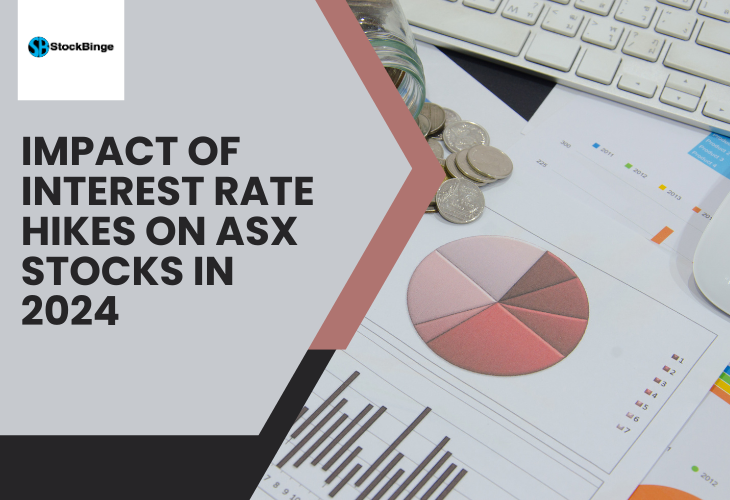Blog Details
- Home
- Blog Details

Impact of Interest Rate Hikes on ASX Stocks in 2024: What Investors Need to Know
Discover how interest rate hikes in 2024 are affecting ASX stocks. Learn which sectors benefit, which face challenges, and how to navigate the market in a high-interest environment. Key insights on bank stocks, tech, real estate, and commodities.
Impact of Interest Rate Hikes on ASX Stocks in 2024: What Investors Need to Know
Introduction: What’s Driving the ASX in 2024?
Australia’s stock market has always been influenced by a mix of local economic factors, global events, and market sentiment. But in 2024, one key factor is shaping investor decisions across the ASX like never before: interest rate hikes.
The Reserve Bank of Australia (RBA) has been ramping up interest rates in response to inflationary pressures. While this is good news for savers and banks, it creates a bit of a storm for growth stocks, real estate investments, and sectors that are heavily reliant on borrowing. For retail investors and traders, understanding how these rate hikes impact different ASX stocks can be a game-changer. Let’s dive deep into how the interest rate environment is affecting the ASX in 2024.
What Are Interest Rate Hikes and Why Do They Matter?
An interest rate hike refers to an increase in the cash rate set by the Reserve Bank of Australia (RBA). This is the interest rate at which commercial banks can borrow money from the RBA. When the RBA hikes rates, it becomes more expensive for banks to borrow, which is then passed on to businesses and consumers in the form of higher loan rates.
For investors, this is critical because it affects everything from mortgages to business loans, and ultimately, the profitability of companies across different sectors. Higher interest rates generally mean higher borrowing costs, which can squeeze profit margins for companies that rely on cheap credit to expand.
The RBA has been implementing these hikes in a bid to cool inflation, which reached its highest levels in decades. However, the immediate impact on ASX-listed companies varies from sector to sector, and savvy investors need to be aware of the implications.
How Interest Rate Hikes Affect ASX Stocks
1. Impact on Banks and Financial Stocks
Why Banks Benefit from Rate Hikes
ASX bank stocks tend to benefit from interest rate hikes. Here's why:
- Higher interest rates mean a larger interest margin for banks. This is the difference between what banks pay for borrowing money (from the RBA) and what they charge customers on loans, credit cards, and mortgages.
- Commonwealth Bank (CBA), Westpac (WBC), and ANZ (ANZ) are often seen as solid plays during interest rate increases because they tend to report better profits due to higher net interest income.
- Insurance companies and superannuation funds can also be positively impacted, as they often hold large portfolios of fixed-income assets like bonds, which rise in value when interest rates go up.
Risks to Consider
However, the flipside is that higher interest rates could dampen consumer spending, which can lead to higher loan defaults. So, while ASX banks may see an uptick in profits from the lending side, they may also face a rise in bad debts, especially if the housing market starts to cool significantly.
2. Growth Stocks and Tech Companies
The Struggle for Tech Companies
On the other end of the spectrum, growth stocks, particularly in the technology sector, often struggle in a rising interest rate environment. Here’s why:
- Higher borrowing costs can limit the ability of tech companies to fund expansion or invest in research and development (R&D). Many high-growth companies rely on cheap debt to finance their growth strategies, so rate hikes can make this more expensive.
- ASX tech stocks like Xero, Atlassian, and Zip Co have historically benefited from low rates, which encourage high levels of investment and expansion. However, as interest rates rise, these stocks may become less attractive to investors who are seeking immediate returns.
- Valuation multiples for tech stocks are often higher than those of traditional businesses, and when interest rates rise, the present value of future profits declines, which can lead to a sell-off in these stocks.
Investor Sentiment on Tech Stocks
In essence, if you’re holding high-growth ASX tech stocks, you might want to keep an eye on how the RBA's rate hikes impact their bottom line and investor sentiment.
3. Real Estate and Property Stocks
Higher Rates = More Expensive Mortgages
The Australian housing market is another area that feels the pinch when the RBA raises interest rates. Here’s the breakdown:
- Mortgage rates rise, making it more expensive for buyers to purchase property, which can cool the housing market. This affects property developers, real estate agents, and companies in the residential property and commercial property sectors.
- REITs (Real Estate Investment Trusts) like Goodman Group (GMG), Stockland (SGP), and Mirvac Group (MGR) may experience weaker demand for their properties, especially in the retail and office sectors, as businesses start to tighten their belts.
- However, property stocks that focus on industrial properties or logistics may fare better, as online shopping and demand for warehouses continue to rise.
Conclusion on Property Stocks
While rate hikes are not the death knell for property stocks, they could signal a period of
4. Consumer Discretionary and Retail Stocks
Impact of Rate Hikes on Consumer Spending
When interest rates rise, consumer spending often falls as Australians tighten their belts. This directly affects companies in the consumer discretionary sector—think retail, travel, and entertainment stocks.
- Retailers like Woolworths (WOW), Coles (COL), and JB Hi-Fi (JBH) could see a drop in sales as consumers pull back on spending due to higher debt repayments and inflationary pressures.
- Automotive stocks and travel companies also feel the heat. Australians may delay big-ticket purchases like cars and holidays when interest rates rise, which impacts companies like CarSales (CRZ) and Qantas Airways (QAN).
Defensive Stocks to Consider
For investors, this means looking at companies with strong balance sheets, solid revenue streams, and those that might be less dependent on consumer spending. Conversely, defensive stocks (e.g., supermarkets, healthcare, utilities) tend to do better when the economy slows down.
5. Commodities and Mining Stocks
Commodities Benefit from Weaker Aussie Dollar
Australia is a major exporter of commodities, and the mining sector is a key player on the ASX. Rising interest rates can have both positive and negative effects on this sector:
- On the one hand, the Australian dollar tends to weaken when the RBA raises rates, which can make Australian commodities more attractive to foreign buyers, pushing up the prices of resources like lithium, gold, and iron ore.
- Mining giants like BHP, Rio Tinto, and Fortescue Metals may see profits increase if commodity prices rise as a result of a weak Aussie dollar.
- However, a higher interest rate environment could dampen global demand for commodities if it slows down global economic growth. Investors need to watch out for signs of global recession or slowdown in major markets like China, which is a huge consumer of Australian exports.
Conclusion on Mining Stocks
If you're invested in mining stocks ASX 2024, keep an eye on global commodity prices and the Aussie dollar, as these will be pivotal factors in determining the performance of major mining players.
Conclusion: Navigating the ASX in a High-Interest Environment
In 2024, the impact of interest rate hikes on ASX stocks is already being felt across various sectors. While some stocks, particularly in the banking, energy, and mining sectors, may benefit from the changes, growth stocks and consumer discretionary stocks are facing a more challenging environment.
For investors, this means taking a strategic approach to portfolio management—considering the sectors that will thrive in a rising interest rate environment while also being aware of those that may struggle. Understanding the economic landscape and staying informed about RBA decisions will be crucial as interest rate hikes continue to shape the direction of the Australian stock market in 2024.
Remember, it’s always wise to diversify your portfolio and consider seeking professional advice to ensure you’re positioned to navigate the shifting market conditions.
References & Sources:
- Reserve Bank of Australia - Interest Rates Overview (2024).
- Australian Financial Review - Impact of Interest Rate Hikes on ASX Stocks (2024).
- The Australian Bureau of Statistics - Consumer Spending and Economic Indicators (2024).
- ASX Official Website - Bank Stocks & Interest Rate Hikes (2024).
- RBA - Monetary Policy and the Australian Economy (2024).
ABN 54 672 177 347 | ACN 672 177 347
Copyright © 2026 StockBinge. All Right Reserved. Design by StockBinge.
